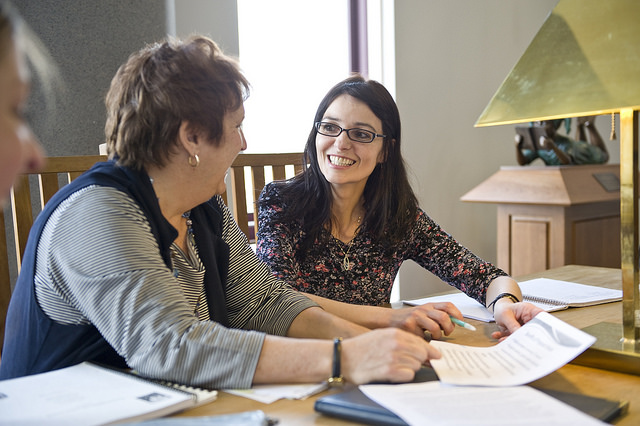If you were visit Associate Professor of Business Cristina Ciocirlan in her Elizabethtown College office, you’d find an ornate souvenir from her time in China. As she removes it from the shelf during an interview, she explains that, while out to lunch with a professor and one of his graduate students during her short-term trip, she admired the restaurant’s teacups and saucers. A few hours later, back in her hotel room, she received a phone call: a package was waiting for her. It was a full set of the same china in a wooden box, sent by her Chinese colleague.
While she had studied China and teaches about business in the country, its customs—such as this example of hospitality—really “sunk in” when she experienced the culture first-hand. It’s stories like these, Ciocirlan says, that she likes to share with her students—and the way to find these stories is go in search of them. That’s one reason she applied to the Fulbright US Scholars Program. But she almost didn’t.
Winning a prestigious Fulbright award was a surprise for Ciocrilan, who says that in past she “never dared apply.” But that sentiment changed last year; She was inspired by Elizabethtown Professor of Social Work Peggy McFarland, who spent the 2014 academic year in Vietnam–the two had collaborated on an interdisciplinary Think Tank project (see photo above). Still, when she received notification of her award… “I was shocked.”
As a Fulbright scholar to Durham University Business School in Durham, England, Ciocirlan will again immerse herself in another culture. Although the differences between the United States and the United Kingdom aren’t as pronounced as those between the U.S. and China, she says the subtle differences are important.
“The UK is similar to the U.S. with its history, its language and its values, but there are nuances,” she said. “Living there for four months, I will learn more about customs, traditions and idioms.”
While at Durham, Ciocirlan will collaborate with Durham’s Dr. Victoria Wells on research related to discretionary environmental behaviors (DEB) in the workplace, a relatively new area of research. In her Fulbright proposal, she explains her project as “the intersection of the broader field of environmental psychology and organizational behavior.” Examples of DEB include employees who voluntarily recycle or reduce energy, even if the practices are not official company policy, or those who lobby for a greener work environment. Her research—both qualitative and quantitative—will, among many other aspects, help define what it means to be a “green employee”, explore what impacts DEBs have on their workplace, and hone in on the negative effects of an environmentally altruistic person working in a job that is not environmentally friendly. She and Wells will partner with Global Action Plan, an NGO which will provide data.
This research will yield lessons for integrating environmental considerations into operational practices, and thus ‘greening’ an organization’s culture…”
According to her proposal, “This research will yield lessons for integrating environmental considerations into operational practices, and thus ‘greening’ an organization’s culture,” she said.
This is not Ciocirlan’s first time in the UK; she studied there for a term during graduate school, but the Fulbright fellowship will be a completely different experience, she said. While the Fulbright program has many benefits for the scholar’s home institution, including enriching teaching and research, part of this experience is also what Ciocirlan will bring to the host institution: a “two-country, cross-cultural perspective to Durham University.” (Ciocirlan is a native Romanian and naturalized U.S. citizen.)
Ciocirlan’s children will accompany her to England, and will enroll in school there. She’s already helping them to prepare by way of unofficial homework: “I asked them to watch the BBC—at least one news segment a day.”
She plans to learn plenty herself. For example, working alongside colleagues at a different institution might expose her to new research methods and innerworkings of another academic department.
“I want to get as much information as I can; I’ll be a sponge [while I am there].”
She also plans to explore the UK, including venturing to Scotland to see Adam Smith’s Panmure House and, since it’s not too far by ferry, visiting Amsterdam.
Ciocirlan is one of two Elizabethtown College faculty semesters who will be abroad as a Fulbright scholar in fall 2015. Bob Wheelersburg, sociology/anthropology, will be in Iceland researching arctic policy.


